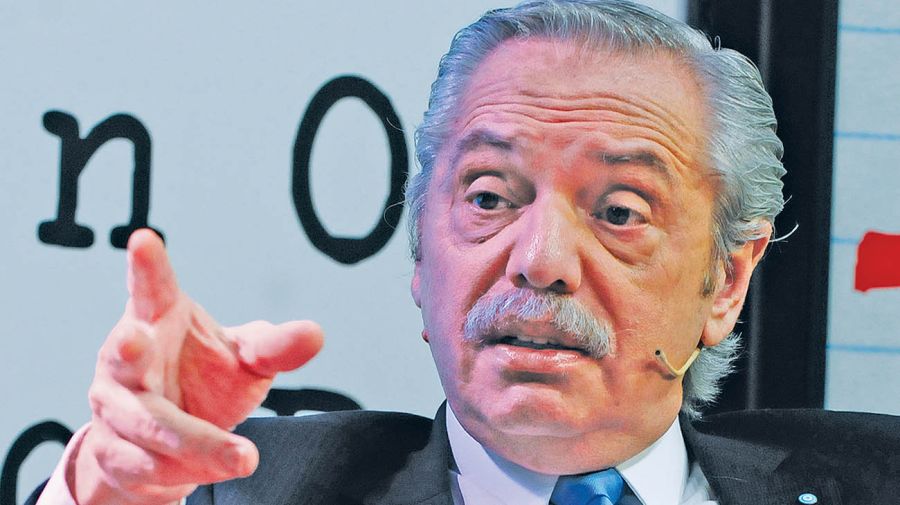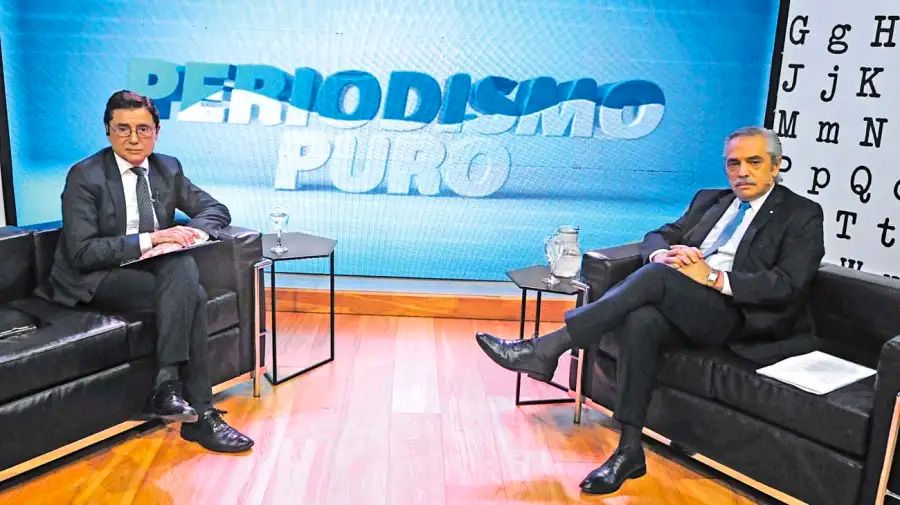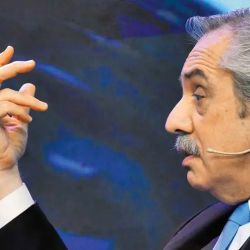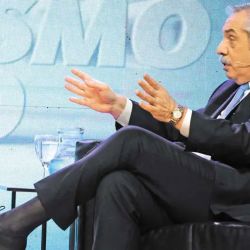Six months after the allegations were first lodged with the courts, former president Alberto Fernández talks about the charges of gender violence and psychological mistreatment levelled against him by his ex-partner Fabiola Yáñez, the mother of his son Francisco.
In a lengthy interview, he discusses the beginnings of their relationship, abortion and the former first lady’s accusations, addressing the photographs found on the mobile telephone of his then-secretary, which had been forensically appraised in the framework of another corruption investigation probing state insurance during his administration.
Fernández, 65, states his enmity with judge Julián Ercolini and answers questions regarding the video recorded in the Casa Rosada featuring Tamara Pettinato, the so-called ‘Olivosgate’ scandal and the Covid-19 pandemic.
This interview – which the Times will publish in two parts, with the second section to come next week – has been trimmed and edited for clarity, though the ex-president’s remarks have not been altered.
IN THE BEGINNING
In the statements you made in your defence in court a few days ago, you said you did not recall when you got to know Fabiola Yáñez but it was when she interviewed you as a journalism student. She told the court that the relationship began in 2010. Was Vilma Ibarra your partner at that time?
I was then indeed with Vilma. What happened there had nothing to do with Fabiola. I know that because she asked me for an interview as field work, I granted it and that’s when I began to know her. But it’s not as if a bond of any other nature was formed. I just got to know her then.
You say that as from that interview with Fabiola, you shared lunches and dinners and met sporadically, so you could help her with her studies and to find work. So from the start...
Excuse the interruption but I’m talking about when I got to know her, not when the relationship with her began, which was in 2016. In the interim we saw each sporadically, which is when I got to know a bit more about her life and problems and also her virtues. A woman whose tenacity I always highlighted because in a background of great adversity, she really made huge efforts to complete her studies. And the bond basically arose from those studies because after that first interview for her field work …
In May, 2016 the relationship was formalised by her pregnancy although finally she had an abortion.
No. We made the relationship formal and two months later she told me she was pregnant.
In your court statement you say that she decided to have the abortion without consulting you and that she notified you when it had already happened.
I want to be frank. I find it very difficult to talk about Fabiola because she has health problems which have determined what we are experiencing. I don’t want to enter into the media game pushing this lawsuit because it seems to me that in the end it does her a lot of harm and not just to me.
Now it’s not like she tells it, no way. It was her decision and she’s always had problems getting used to the idea of maternity. That had nothing to do with me, before knowing me, she already had issues with maternity, which scared her, it seems to me. It’s true that I did not tell her what she was hoping might be my expectations but that in no way meant I didn’t want a child. So much so that when she told me, I must confess that it had an impact because my life plans did not already include thinking of having a child but the only thing I asked of her was to let me talk to my elder son Tani [Estanislao, aka Dyhzy] because he had no knowledge of my relationship with Fabiola and far less that he might have a brother at a time when he was taking his university exams. I remember he was taking one on a Friday and I told him that once he’d finished, I’d drop by to pick him up, which is when I told him. His initial reaction was surprise but afterwards he said: “Great, I’m going to have a brother!” He was so happy that we went on to pick up his partner and we organised a meal with Fabiola in Puerto Madero where we toasted her pregnancy. I never told my son that Fabiola had had an abortion, I told him that there had been a miscarriage because I found out about the abortion when it had already happened.
You mentioned her health problems. Fabiola Yáñez says that her psychological treatment at the Instituto INECO was the result of your pressure, in particular because you were able to control it, and that the diagnosis given her there was false.
That’s very simple to explain and I have no reason to lie. Firstly, it seems really rash to say that anybody could manipulate the INECO.What she is affirming is that I had the capacity [to dictate] the diagnosis and the medication at the INECO.
I do not know any of the doctors who treated Fabiola. I must have met at least one of them at one of the interviews to which I was summoned but I have no relationship. What objectively happened is that she was then very depressed. I explain all this because after the pregnancy she went to London on her own account. On her return, we got together again in 2017 and she entered into a new depressive phase. I was in the living-room of the flat where I live and she was in the bedroom. I suddenly saw her come out with a laptop – I have the image engraved in my head – and she told me: “I’ve found a place where I think they can help me.” And my first reaction was to tell her that it was the best thing I’d heard, her realising that she needed help. “If you’ve found a place, let’s take a look at it already,” I said. So she showed me INECO’s web page. I did not have the faintest idea what it was. When I took a look, I found that its president was [neurologist, now national deputy] Facundo Manes so I immediately called him up and he told me on what day to come and see him. I went with her, Facundo received us and heard us out. He asked me for a couple of days and then sent me a WhatsApp message telling me that he would ring up such and such a doctor to handle Fabiola’s treatment. Then came the diagnosis, which I have in reserve as it says in the file ... but it’s very rash to say that I had the power to boss INECO around and medicate her badly at my behest. That’s really crazy.
After 2016, Fabiola had another abortion in early 2017 upon her return from London. According to the elDiarioAR portal, you had no idea, is that right?
I found out in the course of this case, I knew absolutely nothing about that. She never told me nor that she went to the [Hospital] Otamendi, nor that her period was delayed or anything …
Your relationship with her resumed after her return from London.
After a while, yes.
So you weren’t formally with Fabiola when your presidential candidacy was announced?
I was but it was a relationship with plenty of back and forth. I spoke with Cristina [Fernández de Kirchner] on a Wednesday, whereupon I called Fabiola and told her I had to talk to her. Upon arrival, I explained: ‘You’d be very exposed occupying that position because the focus would fall on you as centre-stage and the media are merciless, so I want you to decide what you want, we can carry on as we are, without your taking on the obligation of being first lady, or you could assume that role. But I’d ask you to think it over because you’re not in the best of shape.’
She immediately told me that she wanted to join me at my side. I told her that it was her decision but that I had to warn her that it might affect her ... I believed that it was the media pressure which largely triggered all this problem because when the problem of Olivos arose, I think she exploded.
LIVING AT OLIVOS
Let’s move on to you becoming president and moving to Olivos. What was life together like in the presidential residence during that first 18 months, before that toast photo [the so-called ‘Olivosgate’ scandal]?
It was pretty good but with problems because Fabiola’s health difficulties make life very difficult for anybody accompanying her. In her statement Fabiola says that I drank alcohol when I never did [to excess] in all my life. That does not mean that if you offer me a glass of wine over dinner, I won’t accept it, drink it and enjoy it but I’m not a compulsive drinker. In fact I never drink any hard spirits, I don’t like or enjoy them. That first month we already started with the Christmas and New Year’s Eve of 2019 with her problem with excessive alcohol but I always tried to be understanding because at the end of the day I’m talking to a person with health difficulties to whom I cannot adjudicate misconduct, with a health problem derived from psychological disorder. There were difficult moments in that first year, always the product of the same thing. But I believe that the breaking-point began with that famous photo of the Olivos dinner.
After that photo circulated in the media, you said at an Olavarría rally: ‘My dear Fabiola arranged a meeting she shouldn’t have.’ And in your defence testimony you refer to that moment saying: ‘From that point all the media almost daily interpreted that phrase as a way of dumping on Fabiola the responsibility for what happened.’
Three days later I said something else and criticised those who said that, that’s also in the statement. Three days later, I went to La Matanza and said that they were scoundrels. Because what I had said was ‘Fabiola had organised,’ and in hindsight, I realise that I shouldn’t have said that and placed all the political responsibility on myself.
And how come you failed to realise that [the party] could not be held?
Firstly, you have to understand what Olivos was like at the time of the pandemic, it was Government House, full of people who came to see me non-stop. In fact that meal passed me by because beforehand I had a meeting with more people present.
But they were people at work, like journalists and essential services.
Exactly.
But not a birthday [party].
Yet the health risk was exactly the same. That morning Fabiola had asked me if there was any problem if the four or five kids working with her stayed on to eat. And I said ‘no,’ because those working with me also stayed to eat with me that day.
What surprised me when I entered was the meal. And the truth is I paid no attention to it, sincerely. I stuck around for a short while and then left because my head was somewhere else. I sincerely believe that it was an enormous political error. That’s why I apologised and excused myself, submitting to whatever the courts might have to say.
Would your story and Peronist history have been different if there had not been any Fabiola birthday party at the peak of the [Covid-19] pandemic?
That was very ably exploited by the opposition to punish us and it was also an issue which left us pretty defenceless because I clearly committed an error and that surely influenced it. Isn’t this reading of mine similar to yours and indeed that made by everybody?
Regarding what?
That we paid a high political cost for holding the party and that photo going public, that’s what everybody said. Because Fabiola says that I dumped the result on her. It wasn’t me in particular, it was the general context of that reading.
One thing is attributing to you the responsibility for not having prevented it, as befits a leader according to Saint Thomas Aquinas, and another thing is assigning it to her.
It seems to me that they were ruthless with her, doing her enormous damage. And I believe that she did not see it coming. ... I think that we all lamented that episode.
When the Olivos photo appeared, had you already begun fertility treatment?
Yes. We began [trying] around the year 2020 and I calculate that it was in mid-2021 when we noticed Fabiola was having problems getting pregnant and then they asked us if we were prepared to try in vitro fertilisation. And I said yes.

THE ALLEGATIONS
In her statement, Fabiola says that you kicked her in the stomach knowing that she could be pregnant.
Never did anything like that in my life, anybody who knows me would know that. I don’t know how it happened. There are things which the media almost magically make happen, I passed from being lukewarm to aggressive. I haven’t the faintest idea how it happened.
The truth is that it has nothing to do with my conduct. How am I going to kick her when down on the floor? I was married for 18 years with Tani’s mum and I was 11, 12 years with Vilma. To this day I have splendid ties with both and they keep ringing me up and sending me Christmas and New Year greetings. They were worried, asking me: ‘What happened, did I go off my rocker one day?’
The day when that famous photo on María Cantero’s mobile telephone, which I had never seen until published and which she could not tell me what day it was, appeared. Now she’s very annoyed with me because she attributed to me the responsibility for not halting the media advance on her due to the issue of the photo. I think it caught her on a bad day.
I’d say, why was it sent to María Cantero? None of her friends say that Fabiola ever talked to her about this issue and neither does her family. There’s not a doctor who says he ever attended her, nor a psychologist. There is a psychiatric examination dated November, 2023, in which she presents the reason for her psychological malaise as being the problem of the media, which I believe. I think that they have indeed done her enormous psychological harm.
But it’s crazy to think that I could have hit and kicked her on the floor when pregnant, that is grotesquely horrific. I think that she has not grasped the dimensions of what she is saying.
If you knew in advance the psychological problems suffered by Fabiola since childhood and the excessive consumption of alcohol, as you explain in your testimony for the defence, did you not think at any moment before proposing that she might be first lady that it could be a complication for your presidency?
Indeed, as I told you, that’s why I asked her to think about it. But I also truly loved Fabiola a lot and one of the things which most pains me about all this is that I know myself to have been the person who most tried to help her with these issues, I’m sure of that.
I loved her greatly, I’m not going to deny that. And the truth is that I did not feel comfortable telling her that I’m going to be president while you have these problems so I’m going to have to leave you behind. Because in human terms that would be a highly discreditable attitude, that’s how I felt.
You testify that the photo in which Fabiola is seen with bruises in her right eye and arm is not the original and thus could have been photoshopped. Why do you think Fabiola resists handing in her mobile telephone for forensic examination?
I don’t know. What I do know is that we could never have access to those photos because she never assented to presenting her mobile telephone. Now this speaks of how this trial functions.
Fabiola said I was harassing her from the moment she lodged the charges so simply on the basis of what Fabiola had said, the judge ordered my home to be raided and my mobile telephone to be confiscated, I gave the codes permitting access to my telephone, which they never opened up for evidence – they didn’t do anything with my telephone.
Fabiola, as you will have heard because she said it everywhere, was saying that she had all the evidence, photos and chats in her telephone. They told her: ‘Could you send us your telephone?’ ‘No, I won’t,’ she replied. ‘So what do you want us to do?’ they asked. ‘I just want you to take out what I said in my chats with Alberto Fernández.’ So they said they would ask the Spanish courts for that and when the Spanish courts expressed willingness, she refused. But neither did the Spanish courts agree to only entering to take out the chats with me. And then she presented a notary’s affidavit, which was very impressive, saying: ‘I have before me Ms Fabiola Yáñez, who has come with a laptop where there is a file in Word where the following texts appear.’ Its value as proof is non-existent because it is a document in Word where anybody can alter, add or delete.
Now the ironic thing about all this trial is that the accused handed in everything to be verified and nobody ever opened up my mobile telephone. And there’s something very interesting there – on December 10 (2023), they began to call me on my new telephone to ask why I was leaving groups like the Grupo de Puebla [chat], which I had never left. Yes, they said: ‘You abandoned the group.’ After the third time I found out that what had happened is that if you do not use or read your WhatsApp for 120 consecutive days, they close down the account, deleting automatically and leaving me without backup for all my WhatsApp. So the day you want to open WhatsApp on that telephone, all those WhatsApp will be deleted.
All that happened to me in this case. People might say: ‘But what does WhatsApp have to do with it?’ It provides fundamental evidence in this case.
Fabiola accuses you of phone harassment, telling her that if she went ahead with the charges, you would threaten to commit suicide. Did you really think of suicide?
That was on a day when I was travelling by train and I called her up wanting to talk to Francisco but she would not put me through. And I indeed told her: ‘You don’t know what I’m undergoing, it’s unbearable, I’m not doing well.’ I really had an enormous burden oppressing my mind because they were accusing me in the insurance case and I have the spiritual calm of knowing what I did and how to defend myself. But how can I defend myself against such lies? Because a wife-bashing man is stigmatised in modern society, beyond the pale. I felt an enormous impotence and my words were very anguished for sure and she would have noticed that for sure and I definitely felt at that moment that I had no future. It’s not as if I told her: ‘I’m going to shoot myself.’
So was there no point to life?
No future, she had taken away all my future. And when I was talking about all the costs this meant, all those costs came along because it meant my distance from Francisco, which is an enormous worry. In the month of December, purely due to the decision of Fabiola Yáñez, I could talk to Francisco 0.3 percent of that time because Fabiola stopped communicating with me once the civil law mediation regarding her economic interests and what I could pay her had closed.
I don’t know if somebody made Fabiola believe that I have a hidden fortune somewhere. I did not take anything with me [from the Presidency] but live off what I collect monthly, which is now less because, as I said would happen, I have had to leave the Spanish University of La Rioja and halt my lecture series. All of this has had negative repercussions in economic terms for both of us, including her …
Why, in the chats which have become public when Fabiola recriminates you for having hit her in recent days, did you neither deny it nor defend yourself saying it was a lie?
Because I never saw those chats. Furthermore, those chats…
...are thus phony?
I don’t know because I never saw them. One striking thing – I never saw them on my telephone.
I would like to explain one thing. The day she wrote that, Fabiola Yáñez, if I’m not mistaken, dined with me and [Uruguayan President Luis] Lacalle Pou at Olivos, with perfect cordiality. Within the next couple of days – I don’t remember exactly when – we travelled to the Iguazú [Falls] and there on Instagram [in a post], she gives the idea she could be pregnant in a photo where she appears clutching her stomach .
If the chats she shows exchanging with you did not exist, wouldn’t it be simpler to just show that and that would be it?
But I don’t have my mobile telephone.
But previously.
But I never saw those chats. I want you to understand me. They laid the charges and then came along and took away my mobile telephone so that I could not check anything. That strikes my attention with the chats she presents.
But you can always ask the courts to show your telephone.
But the courts have had my telephone for the last seven months.
Did you ask for it?
I asked them five times, saying that they could do what they liked with my telephone and then give it back.
Concretely, did you ask for the dialogue of that day to be shown?
But that’s why they took it [the telephone] off me. Now one thing which strikes my attention is that when I saw them published, the chats do not appear to have been read by me. I have always considered the absence of a blue tick [on WhatsApp showing you received and read the message] to be a lack of respect towards the writer so people always know when I read and don’t read [messages].
A message from your woman could not have gone unread.
In the photos which came out there is no blue tick [showing them as read], only grey [indicating they were delivered].
You mentioned that the injury on Fabiola’s arm resulted from you trying to restrain her while she was hitting you, isn’t that right?
No, I didn’t say that. She has a problem of alcoholism in different stages and in one of those stages she gets very violent with insults and saying terrible things and afterwards becoming physically violent. What I was doing was dodging but I was not grabbing her. I was actually trying to hold her wrists, not her arms, and afterwards she generally caved in, entering into a process of very profound anguish.
I would insist that it is very hard for me to speak of these things because these questions have much to do with her intimacy and in truth I have no urge to expose her in that sense …

THAT VIDEO
A video of you in the Casa Rosada with Tamara Pettinato, which Fabiola said she found in the mobile telephone which you gave to Francisco, has been leaked. Independently of that, does having recorded that video embarrass you today in hindsight?
That video was totally out of context, one of the things which has most impressed me about this case, which is apparently about gender violence when I am a great defender of gender policies. I deplore everything the current government is doing enormously and the impact of how they have treated many women in this case …
What happened with Tamara? I’ve known her for many years, she’s one of the most fun persons I’ve ever known in my life, like her father [Roberto], and in human terms, one of the people with the greatest human quality I’ve known in my life.
How did that video happen? She asked me for an interview with Chinese television, telling me: ‘You would help me if you gave me the interview because I’d earn a few pesos.’ I asked her what the questions were and she sent them to me – five in all, containing no conflict. I said to her, ‘Let’s do it, come along beforehand and we’ll eat something and then do the interview.’
That day she was working on the programme of Ernesto Tenenbaum, who is somebody for whom I also have much affection and great intellectual respect even though he criticises me. Ernesto had been merciless with me that morning so I began to tell her: ‘You cannot not contradict Ernesto when he says these things,’ to which Tamara said to me: ‘Stop kidding.’ So I began to say: ‘Let’s do a video with you saying you love me and then send it to him so that he can see that, in spite of what he says, you love me.’ That is the meaning of the video.
I’d say that it’s something pretty common. For example, Ernesto and Tamara once on the air discussed whether I changed Francisco’s nappies, so I sent Ernesto a photo telling him that I had just changed the nappies. And Ernesto answered me: ‘A pair of changed nappies does not prove anything.’ So I recorded a video of me changing Francisco’s nappies, which has stayed in his mobile telephone, such is the mutual trust we have. That was the meaning.
If I had had something to hide with Tamara, I would have deleted it since it was my mobile telephone. And Fabiola did not drag it out of me for show now since she commented on it two years ago. I never deleted it because I don’t know what’s seductive about filming a person saying: ‘Now I have the power, I’m going to have you killed.’ Fabiola made a scandal out of beer being drunk in the Casa Rosada. How could Fabiola turn that into a scandal? Besides, at every presidential meal, it is protocol to offer wine to the guests of the President. That day Tamara said: ‘I don’t drink wine but I’ll have a beer,’ so they brought her a beer.
How long have you known Tamara Pettinato?
I’ve known her for many years, besides which, her father was one of my idols in [the music group] Sumo.
But was that before working with Tenembaum?
No, I got to know her working with Tenembaum.
When President or before?
Before. In fact, her partner is an official of mine. It’s all very nasty… they have a child. The way Tamara has been treated is an incredible injustice. And if there is something I do not deny but thank, it’s being Tamara’s friend. It was a chat between two friends making abstract comments about sex. If I’d had the same chat with a male friend, nothing would have happened.
Do you regret having recorded it?
Seeing how it was used, yes.
Or how it could be used.
How it was used, yes, but that was not its meaning.
Alberto, there are jokes about you and women. [Trade unionist Rubén] ‘El Pollo’ Sobrero saying that if he had rung the bell at Olivos presidential residence at 3am, you would have let him in, confusing him for a long-haired blonde. Or Cristina [Fernández de] Kirchner calling you a ‘pito duro’ [“hard prick”]. They are saying something about your conduct.
Everything they have said has hurt a whole bunch of people working at Government House because the sole fact of entering there to work in my time has converted them into my lovers. I’m not going to take responsibility for that. And besides, a campaign has very clearly been promoted since the lawsuit of Fabiola Yáñez to place me in that role.
But before the lawsuit in the first years of your Presidency, Cristina Fernández de Kirchner was calling you ‘pito duro.’
I never heard Cristina say that.
You will have heard it from third parties.
No, I didn’t and if I had, I would have told Cristina not to talk nonsense.
So you haven’t heard the rumours about your having an above-average predilection for receiving women?
No, and besides, it’s untrue. Placing the focus on women, I received enormous criticism for my Cabinet because I never achieved gender parity. And looking at my appointments of employees, there were far more males than females. And not due to discrimination – it’s just how it worked out. Now the lawsuit is looking at every pretty woman who worked, converting her into somebody close to me.
Did those marital spats you had with Fabiola have as their focus jealousies and presumed infidelities as a recurrent theme?
The truth is that 90 percent of the problems had to do with her addiction to alcohol, as simple as that.
In that first Zoom statement by Fabiola Yáñez from Madrid to prosecutor Ramiro González [questioned recently for hosting a lavish birthday party], did that particular prosecutor make you suspicious in any way?
Absolutely.
Would you like to share that with our readers?
He has been incredibly partial and the case of the mobile telephones is proof of that. Why did he tolerate Fabiola Yañez doing everything she did with hers while confiscating mine and never opening it?
Why didn’t the Federal Appeals Court accept your recusals of the judge and prosecutor?
Well, that is what Comodoro Py [federal courthouse] is like. [Late prosecutor] Federico Delgado, who is somebody whom I always remember with great affection and respect, spoke of [the late Claudio] Bonadio’s courtroom now trying the insurance case, saying that it must be an Embassy because Argentine law does not apply there. The other day I told [Federal Appeals Court judge Roberto] Boico: ‘What Federico Delgado said about Bonadio’s courtroom applies to all federal justice today.’
Let’s see if at any time they behave decently and start to apply Argentine law. And it is truly very difficult to think that after all my run-ins with [federal judge] Julián Ercolini, with whom I have had circumstances of great friendship and profound enmity, which is our situation today. And however much he denies that, it is public and notorious, everybody knows that …
Why did you present those 211 pages [of a court writ], while refusing to answer the prosecutor’s questions?
The prosecutor is a person representing society. He must comply with the mandates of objectivity and equidistance between the two sides – i.e. a prosecutor who cannot ignore evidence benefitting the accused. This prosecutor is a prosecutor lacking the ethical conditions for involvement in this case.
But you are going to be evaluated by how you respond. They can ask you malicious questions but you can always respond.
And I can also ask something. The statement of Fabiola Yáñez quotes my defence lawyer as saying on arrival that she cannot participate on the judge’s orders but she may present a document of questions. When she presented that document, she was told that she could not.
Thus began a case which is totally null and void due to the absolute relationship of common interests which exists between plaintiff and prosecutor.
Production: Sol Bacigalupo.























Comments